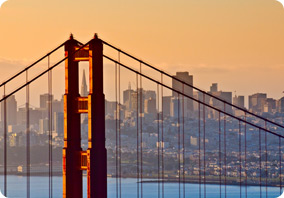
ASP in San Francisco: National Security Threats of Climate Change
Podcast: Play in new window | Download
Subscribe: Apple Podcasts | RSS
On Tuesday February 25, representatives of the American Security Project (ASP) visited San Francisco to discuss how climate change is affecting national security, and the livelihoods of people living in city and state of California.
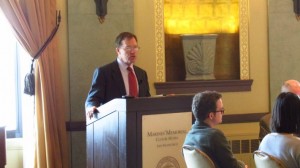 Attending the event were Brigadier General Stephen A. Cheney, USMC (Ret.) and Brigadier General John Adams, USA (Ret.). Cheney is ASP’s CEO and was the Commanding General of Parris Island Marine Corps Recruit Depot; Adams is currently an independent defense consultant and was a United States Military Representative to the North Atlantic Treaty Organization (NATO) Military Committee in Brussels, Belgium.
Attending the event were Brigadier General Stephen A. Cheney, USMC (Ret.) and Brigadier General John Adams, USA (Ret.). Cheney is ASP’s CEO and was the Commanding General of Parris Island Marine Corps Recruit Depot; Adams is currently an independent defense consultant and was a United States Military Representative to the North Atlantic Treaty Organization (NATO) Military Committee in Brussels, Belgium.
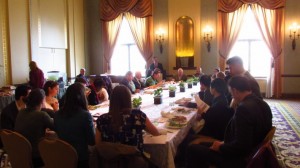 The event was a public lunch discussion at the Marines’ Memorial Club & Hotel in downtown San Francisco. The generals spoke to an audience of over 30 people; including media, businesses, political staff, and foundations. As you will hear in the audio below, the crowd was active and engaged with the generals – asking in-depth questions about America’s national security, and where to go from here.
The event was a public lunch discussion at the Marines’ Memorial Club & Hotel in downtown San Francisco. The generals spoke to an audience of over 30 people; including media, businesses, political staff, and foundations. As you will hear in the audio below, the crowd was active and engaged with the generals – asking in-depth questions about America’s national security, and where to go from here.
During the discussion, both Cheney and Adams touched on their military experiences and the way the armed services are already preparing for the events of climate change.
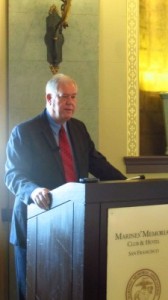 As they said, the climate we live in influences every aspect of everyday life – what you eat, where you live, how you make your living. Changes to that climate will have a direct impact on every one of us. At home, extreme weather presents a direct risk to U.S. homeland security by threatening energy, infrastructure, food production, and human lives.
As they said, the climate we live in influences every aspect of everyday life – what you eat, where you live, how you make your living. Changes to that climate will have a direct impact on every one of us. At home, extreme weather presents a direct risk to U.S. homeland security by threatening energy, infrastructure, food production, and human lives.
Around the world, climate change will affect how American forces interact with allies and enemies. It will increase the demands on U.S. military personnel: we will see more humanitarian interventions, more peacekeeping, and there will be more conflicts to be drawn into. Resources spent on protecting U.S. interests at home and around the world from the threats of climate change are resources we cannot spend on other urgent needs, whether military or civilian.
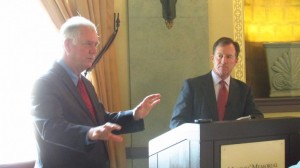 They touched on how the drought in California has highlighted the threats at home. As they said, 90.2% of California is now in “severe drought” or worse, and more than 65% is “extreme drought” or worse. In 2013, San Francisco shattered a nearly century old record for lack of precipitation, experiencing only 5.59 inches, compared to the previous low of 9.00 inches set in 1917 (average is 23.65 inches). We know that farmers have been hit especially hard: nearly 600,000 acres of farmland in the Central Valley region will lay devoid of crops due to lack of water, and $11 billion will be lost in annual state revenue from agriculture in 2014.
They touched on how the drought in California has highlighted the threats at home. As they said, 90.2% of California is now in “severe drought” or worse, and more than 65% is “extreme drought” or worse. In 2013, San Francisco shattered a nearly century old record for lack of precipitation, experiencing only 5.59 inches, compared to the previous low of 9.00 inches set in 1917 (average is 23.65 inches). We know that farmers have been hit especially hard: nearly 600,000 acres of farmland in the Central Valley region will lay devoid of crops due to lack of water, and $11 billion will be lost in annual state revenue from agriculture in 2014.
The military is beginning to plan for the effects of climate change – and to reduce its dependence on fossil fuels. Isn’t it time that our society does so as well? Our political leaders should be at least as active as our military.
For the full audio from the lunch discussion, click below:





